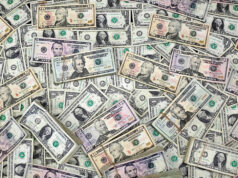Hot money flows out for 2nd month in Sept.
FOREIGN portfolio investments — also called “hot money” due to the ease by which these funds enter and leave the economy — posted a net outflow for the second straight month in September, though by a smaller amount from the preceding month and a year ago, the Bangko Sentral ng Pilipinas (BSP) reported on Thursday.
Hot money recorded a $231.71-million net outflow in September, thinning from the $440.3-million net outflow recorded a year ago and the $391.74 million that left in August.
Gross outflows in September amounted to $1.553 billion, surpassing the $1.183 billion level a year ago but smaller than August’s $1.605 billion.
These offset the $1.301 billion poured in last month that was nearly double the $743.31 million gross inflows recorded a year ago and was slightly bigger than August‘s $1.214 billion.
About 80.2% of investments in September were in securities listed on the Philippine Stock Exchange — mainly to property companies, holding firms, banks, food, beverage and tobacco companies, as well as transport firms – while the balance went to investments in peso-denominated government securities, the BSP said.
The United Kingdom (UK), the United States, Singapore, Malaysia and Luxembourg were the top five sources of investments, accounting for a cumulative 72.3% of the total.
The BSP attributed hot money’s net outflow in the past month to “ongoing trade tensions between the US and China; attacks on Saudi Aramco’s oil facilities in Saudi Arabia which triggered the largest jump in oil prices in decades; the US Federal Reserve’s decision to cut interest rates; the BSP’s decision to cut interest rates and the reserve requirements ratio of banks; and the impeachment inquiry against US President Donald Trump.”
Sought for comment, analysts pointed out to similar factors and also mentioned global developments like the UK impending exit from the European Union at the end of this month and declines in global bond yields.
“Hot money [in]flows improved slightly in September after declines in US and global bond yields while the FOMC (Federal Open Market Committee) cut interest rates. The protracted trade tensions between the US and China, however, ate up gains leading to a bigger outflow on balance,” Security Bank Chief Economist Robert Dan J. Roces said in an e-mail.
ING-NV Manila Senior Economist Nicholas Antonio T. Mapa noted in a separate e-mail that “[s]entiment has improved significantly since that time with the US and China back on negotiations with an initial swap of concessions coupled with increased expectations for Fed rate cuts in October as economic data heads south.” — Luz Wendy T. Noble



